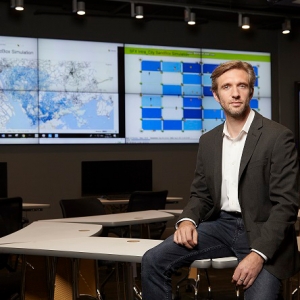Machine learning is one of the fastest growing technologies today. The ability to analyze large amounts of data — and learn from it — helps organizations make better business decisions, increase productivity, and improve the customer experience. The applications are seemingly endless, from online shopping suggestions to self-driving cars.
To further their research opportunities in this growing field, researchers from the Center for Machine Learning at Georgia Tech recently signed a memorandum of understanding (MOU) with the RIKEN Center for Advanced Intelligence Project (RIKEN-AIP) in Japan and is in the process of signing a similar MOU with the Fraunhofer Institute for Integrated Circuits IIS (Fraunhofer IIS) in Germany to formalize a collaborative working relationship on machine learning.
“The goal of the MOU is to combine the strengths of the different players in order to be more competitive, to be able to tap into different companies, and work on different large-scale projects and activities,” said ISyE David M. McKenney Family Early Career Professor and Associate Professor Sebastian Pokutta, who also serves as associate director of the Center for Machine Learning. “On a very fundamental level, different research cultures inform different problem-solving approaches. If you look at how research is conducted in Japan, Germany, and the U.S., you will see that they are all very different. Diverse perspectives often lead to better outcomes. It was a very natural fit to bring these three units together.”
Both RIKEN-AIP and Fraunhofer IIS are independent research centers designed to provide agility in projects and facilitate industry interaction. They employ world-class researchers and are making an investment in machine learning. Georgia Tech naturally fits into the picture.
“We have a very integrated approach to machine learning,” explained Pokutta. “We look at it from both a purely machine-learning or methodology perspective, but we also integrate engineering and the sciences. That’s what makes our approach unique. In addition, our machine-learning Ph.D. program is very tightly integrated with the other machine-learning efforts, which creates this seamless interaction between the students and the faculty. I think that is the strength of Georgia Tech in this set-up.”
The partnership also reduces cultural barriers and leads to improved interaction with companies in Japan and Germany. “It helps to have a local partner that speaks the local language, especially in Japan,” said Pokutta. “It allows us to be more effective when working with Japanese companies. And they like to have an international partner because they can tap into international talent that they might not have in their respective locations.”
Another aspect of the collaboration is to foster knowledge exchange in machine learning by hosting workshops in the various locations. The most recent was a three-day conference on machine learning and discrete optimization held in Tokyo this past summer. The goal was to bring together discrete optimizers and machine-learning researchers in an effort to bridge the fields and stimulate cross-disciplinary interaction. Approximately half of the attendees were affiliated with the MOU, but the workshop also drew speakers and companies from a wider audience.
The team is currently in discussions with companies about potential research opportunities and hopes to begin a project in the near future. “The next steps are now to further intensify the collaboration, which includes a Ph.D. student and faculty exchange, as well as interacting with various industries both in Japan and the U.S.,” said Pokutta.
